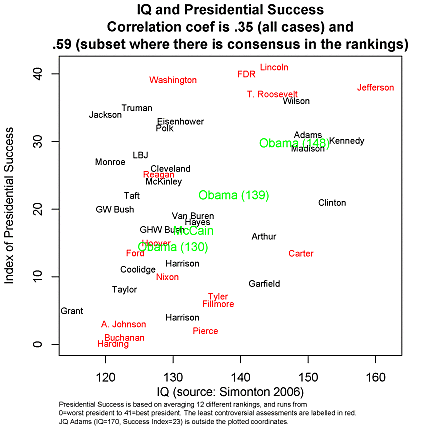William F. Buckley famously said he’d “rather be ruled by the first 500 people in the Boston phonebook than the faculty at Harvard University.” There’s surely something to that, though the worst president in American history was a Princeton man.
Here’s an interesting graph comparing presidential success with presidential IQ. (Explanation here.) (Hat tip: Marian Tupy.)
It’s a fun conversation piece, but it doesn’t tell you much. First of all, all the conventional rankings dramatically downgrade “do-nothing” presidents, so the version of presidential greatness used is always going to overvalue drama, explosions, and ambitious plans to remake the country and the world. Note that here, once again, Warren G. Harding is the Rodney Dangerfield of presidents, ranked dead last despite his admirable record on separation of powers, size of government, and civil liberties.
Moreover, the IQ data are highly dubious, especially the further back you go in history, where it appears to be based on presidential biographies and personal papers, rather than standardized tests from college or military service. When I first looked at the graph, I wondered how they’d concluded that JFK was brighter than John Adams and James Madison, who didn’t need ghostwriters to make them seem smart. It turns out, according to JFK biographer Thomas Reeves, that “Kennedy was actually given an IQ test before entering Choate. His score was 119,” much lower than what he’s assessed at here.
In any event, given the difficulties of assessing IQ from a distance of generations, and the contentious nature of presidential greatness, it’s hard to draw any firm conclusions about the relationship between intelligence and presidential “success.”
However, too many conservatives, it seems to me, are too quick to conclude that brains don’t matter much when we’re choosing a constitutional chief executive. The reasoning seems to be: Jimmy Carter was smart, and he was a bad president; Reagan went to Eureka College and the intelligentsia sneered at him, yet he was a good president. Therefore, we should count ourselves lucky if and when we get George W. Bush and Sarah Palin. This sells Reagan short (and Carter too?): Reagan wasn’t an intellectual, but he was very interested in ideas and anyone who’s seen Reagan’s handwritten 1970s radio speeches, for example, knows that his intellect was nothing to sneer at. His success certainly doesn’t mean that unremarkable intelligence and lack of intellectual curiousity are virtues when it comes to the office of the presidency.

